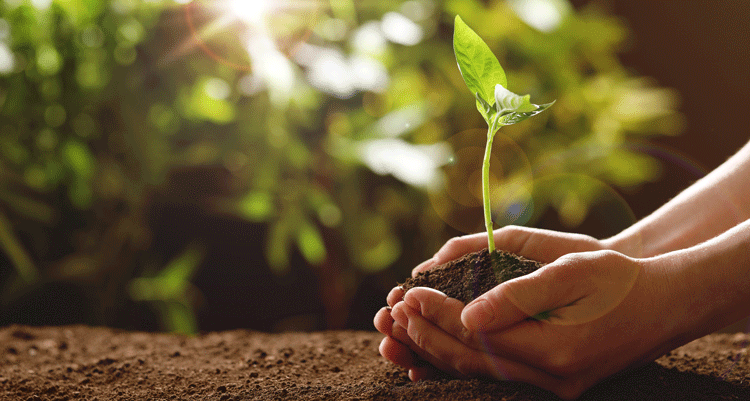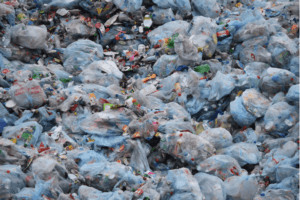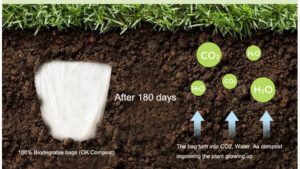Why Choose Compostable Bags?

We might use plastic bags for grocery shopping, to contain our trash, or to pick up after our pets. But those who care about our planet should know that compostable shopping bags, trash bags and dog poop bags are a far more eco-friendly, ethical and sustainable option.
So, let’s explore why we should make the switch and choose compostable bags rather than the non-compostable options:
The Problem With Non-Compostable Plastic Bags

Plastic bags are a major problem. On this planet, we use a shocking 5 trillion plastic bags each year. That is more an 700 a year for each individual on Earth and 160,000 each and every second!
Of course, all those bags, usually made from polyethylene, took fossil fuels to make. Petroleum derived, they require these finite and polluting materials to make them. And the energy used in manufacture usually involves burning more of fossil fuels too. Use around 14 plastic bags, and you will have used the same amount of fuel required to drive one mile.
Yet most of those bags are simply thrown away. Every ton of plastic bags recycled saves the energy equivalent of 11 barrels of oil. But less than 1% are actually recycled.
The plastic bags that are thrown away often end up in landfills, or blow away into the surrounding environments. They join all the other plastics we throw away each year. Ultimately, around 10% of all this plastic waste will end up in our oceans.
Plastic bags, along with food containers and packaging account for around 31.7% of the municipal solid waste stream. They are also the largest component of floating marine debris (excepting items less than 5mm such as pre-production plastic pellets, fragments, and polystyrene pieces).
It is important to remember that each one of those plastic bags can take 1,000 years to break down – a long time, especially considering we each one, on average, for just 12 minutes.
Though plastic bags won’t biodegrade, they will break down into ever smaller and smaller pieces. In the ocean, the sun breaks down these plastics into tinier and tinier pieces, a process known as photodegradation. Over time, they fragment into tiny micro-plastic particles, that are an even more dangerous problem.
The negative impact of plastic bags and other plastic pollution in the ocean have been well documented. Both in larger pieces, and when they degrade to micro-plastics, plastic bags pose a major and lasting threat to marine ecosystems and marine wildlife, as well as to human health.
- Wildlife gets entangled in larger pieces of plastic, and can be injured or killed.
- Diverse marine creatures – from birds, to fish, to turtles, to whales – and more – ingest plastic – mistaking the debris for prey. They are often internally injured, and frequently, they die of starvation as plastic builds up in their digestive systems.
- Ingesting plastics also leads to infections and mobility problems for a range of marine creatures.
- Floating plastics are also implicated in the spread of invasive marine species, pathogens and bacteria, which disrupt ocean ecosystems.
- Several chemicals used in the production of plastic materials are known to be carcinogenic and to interfere with the body’s endocrine system, causing developmental, reproductive, neurological, and immune disorders in both wildlife and humans. Yet micro-plastics are in the food chain.
- Further toxic contaminants also build up on the surface of plastic in the ocean. These enter the food web and also pose a risk to wildlife and (when they eat seafood) people too. We are all familiar with the ugly site of plastic washed up on beaches, despoiling local beauty spots and impacting local tourism. But it is important to understand that the negative effects of plastic go much deeper, and much further. Micro-plastics now permeate every single ecosystem on Earth – they are even found within the human body – ending up on out plates through the things that we eat.
How Are Compostable Bags Better?

First of all, in order to understand why compostable bags are better, we need to understand what they are. What are compostable bags made from? And what makes them better than the alternatives?
Unlike most synthetic plastic bags, biodegradable bags break down over time – they won’t remain for hundreds of years in the environment. Compostable bags go one stage further. They break down in a natural soil environment (or in your compost system at home) into only natural and inert ingredients. Essentially, they become organic fertilizer – which could help your garden grow strong. Nothing nasty or harmful is left behind.
Compostable bags, unlike the plastics like polyethylene which are made from fossil fuels, are made from natural plant materials. Biodegradable bags might break down, but may leave inorganic residues behind. So it is best to seek out options which are entirely made from materials like corn starch, which truly are 100% compostable in a home composting setting.
Our compostable bags are made from plant-based biomaterials, without polyethylene. After composting in soil for just 180 days, they will break down into all natural organic compounds – water and CO2.
We should all try to use plastic less. We should refuse, reduce, reuse, repair and recycle to reduce waste and keep our planet healthy and clean. But where we do need to use plastic bags, we should make sure that we always choose compostable options.

Hi, this is a comment.
To get started with moderating, editing, and deleting comments, please visit the Comments screen in the dashboard.
Commenter avatars come from Gravatar.